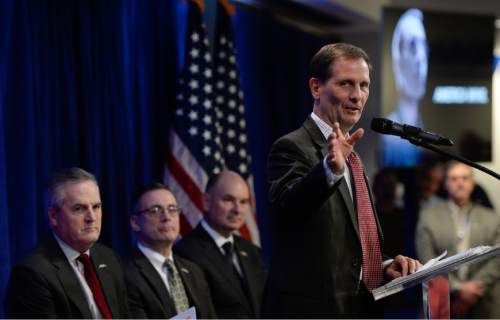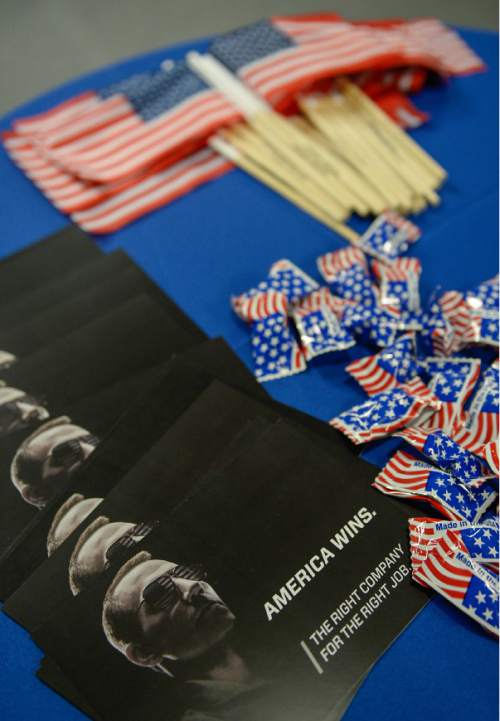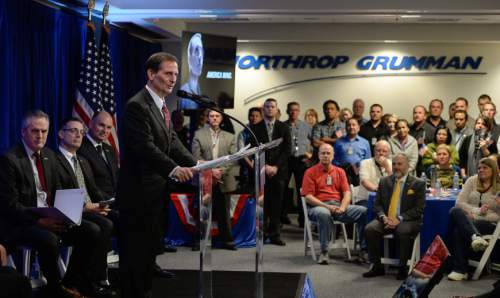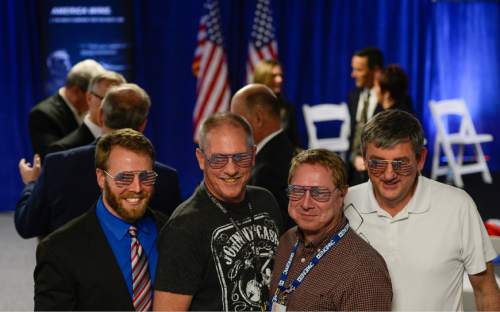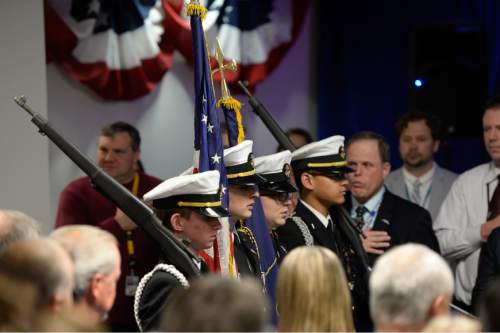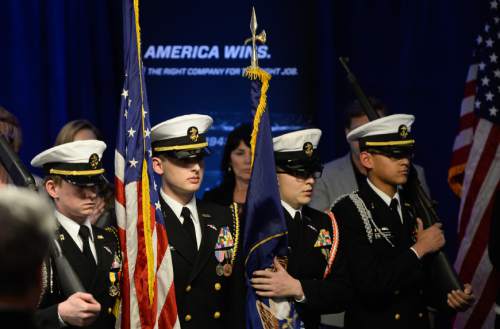This is an archived article that was published on sltrib.com in 2016, and information in the article may be outdated. It is provided only for personal research purposes and may not be reprinted.
Northrop Grumman employees in Salt Lake City were lauded Thursday for the work they are about to embark upon — helping to keep Americans safe for decades to come.
"Thank you so much for allowing us to sleep better at night," said Val Hale, executive director of the Governor's Office of Economic Development (GOED), one of several speakers addressing the importance of Northrop Grumman's upcoming work to develop and build a fleet of long-range strike bombers for the U.S. Air Force.
"You have this great honor of doing something that matters in life," added Utah Rep. Chris Stewart, a former Air Force pilot, in a ceremony at Northrop Grumman's facility near Salt Lake City International Airport. "You can keep America safer and make war less likely."
The Air Force announced in late October that it had selected Northrop Grumman to produce a bomber "capable of penetrating enemy air defenses and reaching targets anywhere in the world."
Seeking over time to build 80 to 100 long-range strike bombers — LRS-B in military parlance — the Air Force approved a two-part contract, worth more than $32 billion to develop a plane to replace aging B-52 Superfortresses and B-1B Lancers.
The first contract provides $21.4 billion in 2010 dollars for engineering and manufacturing. The second authorizes about $511 million for each aircraft delivered in an initial order for 21 bombers.
"Building this bomber is a strategic investment in the next 50 years and represents our aggressive commitment to a strong and balanced force," Defense Secretary Ash Carter said in announcing the October decision, which has been challenged by Northrop Grumman's competitors.
"It's vital to innovate and reinvest in the people, strategies and technologies that will allow America's military to be dominant in the second aerospace century," he added.
Northrop Grumman's Utah operations will play a vital role in that effort.
The company's 1,100 Utah employees — 550 at the Salt Lake City facility, the rest in Clearfield, Ogden, Tooele and Hill Air Force Base — are heavily involved in manufacturing and testing navigational equipment and "situational awareness products."
These high-precision systems are used deep in the ocean and in outer space, on satellites and ground vehicles as well as aircraft such as the long-range strike bomber, which is expected to be operational by the mid-2020s.
"We believe [the Air Force] chose the right company for that work," said Kathy Warden, president of Northrop Grumman's missions systems.
"As we came together to win the bid, now is the time to come together to execute the plan," she encouraged company employees who filled a large meeting room, along with scores of government and business visitors. "You give our [military] an overwhelming advantage when they are called to war — and we're proud of that."
There's no time to waste, Stewart said, citing a range of threats from terrorism to China's growing power in the South China Sea.
"We need you to go build this aircraft and get it on line. Please don't be late. We live in a very dangerous time," he said. "Do you think China noticed that you got this contract? I promise you they did. They recognize it tilts the balance of power toward the good guys."
Northrop Grumman's success will ripple through Utah's economy, one in which the aerospace industry plays an important role, said Hale and Salt Lake Chamber President Lane Beattie.
Hale said 110 companies in Utah are involved now in aerospace work. They're good firms to work for, he added, paying wages about twice the local average to nearly 22,000 employees last year — not counting Hill Air Force Base workers.
"This solidifies everything we're trying to accomplish," added Beattie. "To have a company as well respected as Northrop Grumman get this and be here [in Utah] is key to our whole aerospace effort."
For many Northrop Grumman employees, said worker representative Clay Snaza, there is a sense of responsibility to ensure American military forces go into battle with complete trust in their equipment.
"They trust it with their lives," he said, something the company's workforce can appreciate since 14 percent are veterans, twice the national average.
Northrop Grumman employees, he added, "are one big team of patriotic individuals who understand the trust put in them."


